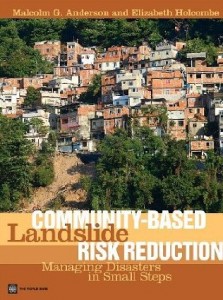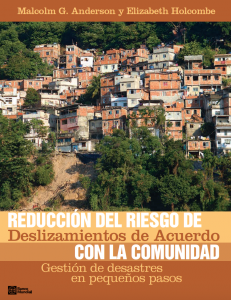Books
‘Community-based Landslide Risk Reduction:Managing Disasters in Small Steps’.
‘Reducción del Riesgo de Deslizamientos de Acuerdo con la Comunidad – Gestión de Desastres en Pequeños Pasos’.
Malcolm Anderson & Elizabeth Holcombe


English: Download the English version here: pdf and read as an e-book
Paperback; 404 pages; 8.5×11
Published: January 22, 2013.
Publisher: World Bank, Washington DC.
ISBN: 978-0-8213-9456-4
Spanish: Download the Spanish version here: pdf
Paperback; 415 pages; 8.5×11
Published: May 13, 2016.
Publisher: World Bank, Washington DC.
ISBN: 978-0-8213-9491-5
Community-based Landslide Risk Reduction: Managing Disasters in Small Steps gives practical guidance to policy makers, project managers, and practitioners on how to work with the most vulnerable urban communities to mitigate landslide disasters. The book aims to establish three foundations for delivering ex-ante landslide risk reduction:
- a scientific base: landslide hazard can often be reduced through the construction of strategically aligned networks of surface drains;
- a community base: community residents are not just seen as those ‘at risk,’ but as the people with the best practical knowledge of the slopes where they live, and who can actively participate in delivering landslide risk reduction solutions; and,
- an evidence base: delivering effective landslide risk reduction measures can change ex-ante risk management practices and policies.
The book provides a flexible blueprint for Management of Slope Stability in Communities (Mossaic) in which policy makers, project managers, practitioners, and communities are engaged in understanding rainfall-triggered landslide hazards, developing local teams for project delivery, prioritizing the most at-risk communities, designing and constructing appropriate slope drainage solutions, and adopting good slope stability management practices. This approach can lead governments to develop new policies for reducing landslide risk.
The approach outlined in the book is based on research and implementation in a selection of Eastern Caribbean small island developing states, with the support and funding of governments and international development agencies.
